Usain Bolt vs. Justin Gatlin: 100 meters for the soul of track?
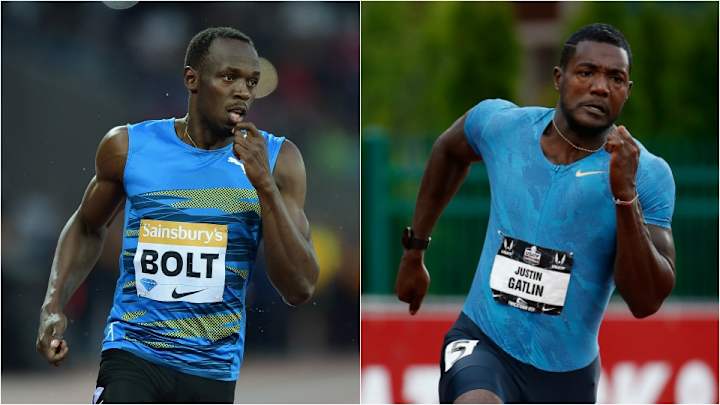
On Sunday evening in Beijing (Sunday morning in the U.S.), Usain Bolt and Justin Gatlin will contest the 100 meters at the world championships (assuming each man survives the preliminary heats without injury or uncharacteristically slow running). There will be six other men filling lanes at the Birds Nest stadium where, in 2008, Bolt first became Usain Bolt, Superhero. Among them probably will be 2007 world champion Tyson Gay of the U.S. and former world record holder Asafa Powell of Jamaica, old sprinters with formidable résumés and no shortage of baggage. Still: The presence of Gatlin and Bolt makes this race the most anticipated global championship matchup since Bolt’s deflating false-start disqualification at the 2011 Worlds in Daegu, where he would have faced ascendant training partner, Yohan Blake.
Before that, you can go back to the 2004 Olympic final in Athens, where the seemingly unbeatable Powell delivered the first of several big-race failures and finished fifth behind gold medalist Gatlin, who at that point was 22 years old and (mostly) untainted by suspicion. (Bolt’s Olympic wins in 2008 and ’12 and his world titles in ’09 and ’13 were, of course, very much anticipated, but largely because Bolt was competing. They were not so much races as arias, and this is true of Bolt’s appearances even when he is seemingly not at his best).
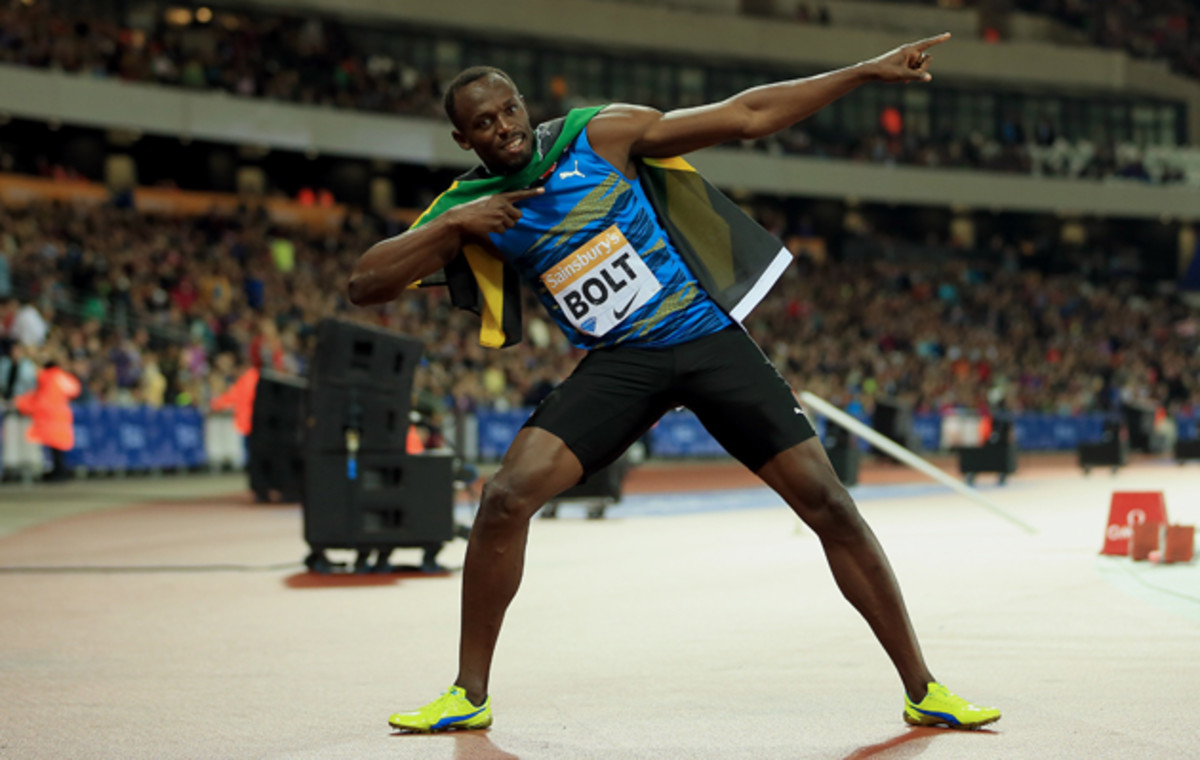
But Sunday’s race (which you can watch, delayed, on NBC later that afternoon, or dig up on a live morning feed somewhere in the corners of the Internet) is fundamentally different from almost any showdown in the history of the sport. It is, on a basic level, the fastest man in history against the fastest man of the year. But it’s much more: In a sport plagued more than ever by revelations of widespread PED use, it is being cast as a race for the future of track and field. If Bolt wins, it is a triumph of the clean athlete and a repudiation of the doping culture, proof that greatness is possible without pharmaceutical assistance. If Gatlin wins, it’s cheating rewarded with money and medals, a trying period in the sport’s history made ever more trying. Joy vs. sadness. Good vs. evil. Light vs. darkness.
No less a figure than Lord Sebastian Coe, double Olympic 1,500-meter champion, former world record holder, distinguished member of British Parliament, head of the London Olympic Games and newly elected president of track and field’s world governing body, said in July, “The sport for all sorts of reasons needs Usain to come through in Beijing.” And then doubled down this week, allowing that while Gatlin “should be respected for the fact that he eligible to compete…. I’m hardly going to sit here—given everything I’ve said—and say that I’m anything other than queasy at the thought of athletes that have served bans for serious infringement going on to win championship titles.”
Sebastian Coe elected as new IAAF president
So this is the desperation level in track and field: One race of 100 meters that unfolds in something less than 10 seconds is expected by its outcome—one man or another crossing the line first—to somehow bring a measure of superficial resolution to a wildly complex and decades-old PED problem and either send the sport forward into a sunny and promising future or throw it into a deep hole of suspicion and disregard from which it might never emerge whole. This is a lot to ask of a footrace.
But okay. I get it. Track and field is very much in need of a moment to celebrate. For seven years, Bolt has been reliably delivering such moments like no athlete in the history of the sport and like very few athletes in the history of any sport. His performances at Beijing (which I covered in person), Berlin (which I did not) and London (which I did) were thrilling nearly to the point of life-affirming. He was—and is—like Jordan or Gretzky or Messi or Lebron—or whoever else it might be that makes you believe that anything is possible on a field or court or rink or pitch or within the straight, white lines of a running track. When Bolt ran 19.19 seconds for 200 meters at those 2009 world championships in Berlin to shatter his own seemingly unbreakable world record, the redoubtable Ato Boldon, broadcasting for NBC, fairly shouted, “Oh my god….” That is what Bolt makes all of us do. Oh my god.
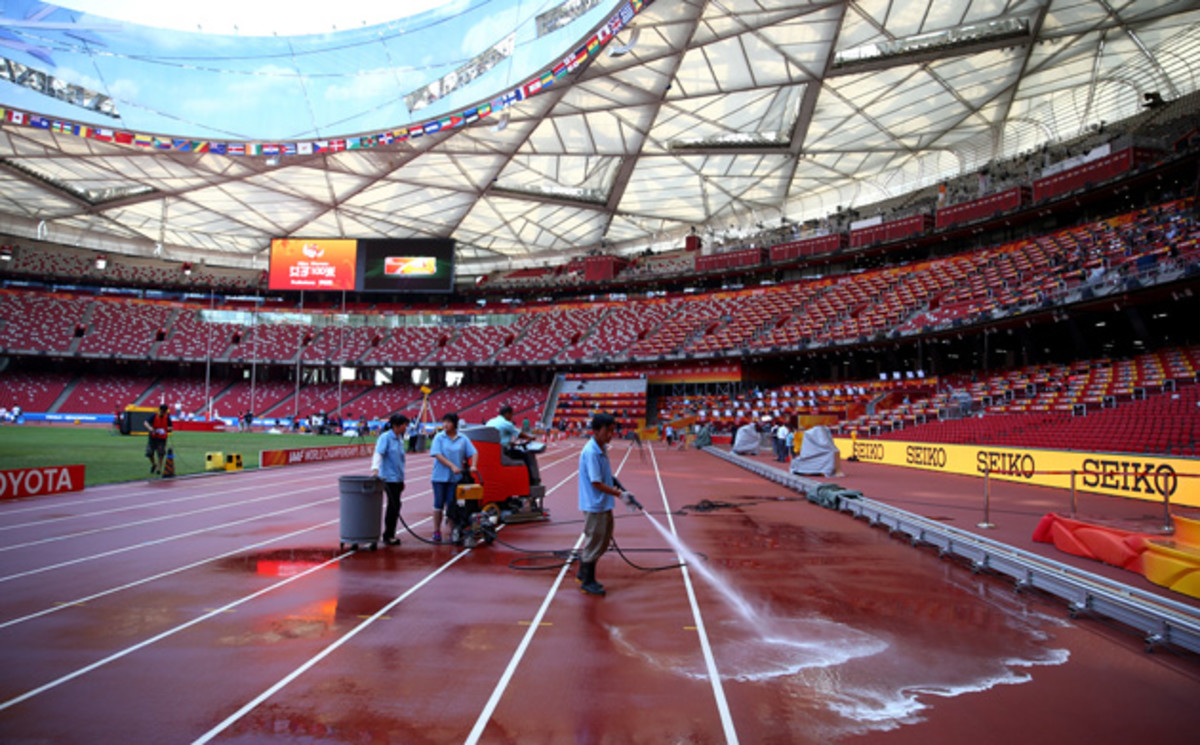
And he does something more: He makes it look, dare I say, natural. (This does not mean that it actually is natural, for any athlete—and I’m not talking about drugs here, but it’s track and field, so you probably immediately assumed that I was. But in Bolt’s case, this appearance of natural speed is compelling and powerful.) He moves with stunning grace and power, a 6’5” adult making his opponents, as U.S. sprinter Darvis (Doc) Patton once said, “look like little kids.” Bolt makes funny faces and silly gestures before folding into his starting blocks, as if this is just a variation on recess. (In comparison, U.S. sprinter Maurice Greene, the 2000 Olympic gold medalist, looked as if his entire body might explode before he was called to his mark; and this is the norm.) When his races are over, Bolt celebrates with an unrestrained joy that fills a giant stadium. As great as Bolt is during a race, he’s better afterward.
For those seven years, The Bolt Show has been track and field. There are no other athletes of consequence in mainstream or athletic culture and, much more ominously, beyond Bolt the sport is a hornet’s nest of doping innuendo, doping suspicion and actual doping. Most recently came a report in the Sunday Times of London and also aired in a documentary on German television which reported that one-third of the medals won in global championship meets from 2001 through 2012 were won by athletes with suspicious tests. The IAAF, the track and field governing body, subsequently confirmed that 28 athletes from the 2005 and ’07 world championships had produced positive drug tests through re-testing with enhanced scientific methods.
2015 IAAF World Championships: Day-by-day events to watch
(All of this news could be viewed two ways: One, cheaters are finally being caught. Good. Or two, my goodness, this sport is a hopeless mess. Initial public reaction always sways toward the latter; it just does.)
So for all these years, it has been the giant beast of doping pulling on one end of the rope and Usain Bolt pulling on the other end, in an apparent battle for the life of the sport. Of course it’s not that simple. But first, there is Gatlin.
When Gatlin won the Olympic 100-meter gold medal in 2004, he was like a lesser version of Bolt, albeit similar in the sense that he was also quite likeable. His victories were less dominant, his celebrations more muted, but he was thoughtful and engaging in conversation and gave off a genuine warmth. “I was the nice guy, right?” Gatlin said to me when I interviewed him in June at the USA Track and Field national championships. And he was, even to the point that media generally cut him slack on training with the notorious coach, Trevor Graham, who triggered the BALCO investigation by turning over a dirty syringe and guided Marion Jones to her drug-fueled victories. (Many people tried to persuade Gatlin to dump Graham; he wouldn’t.)
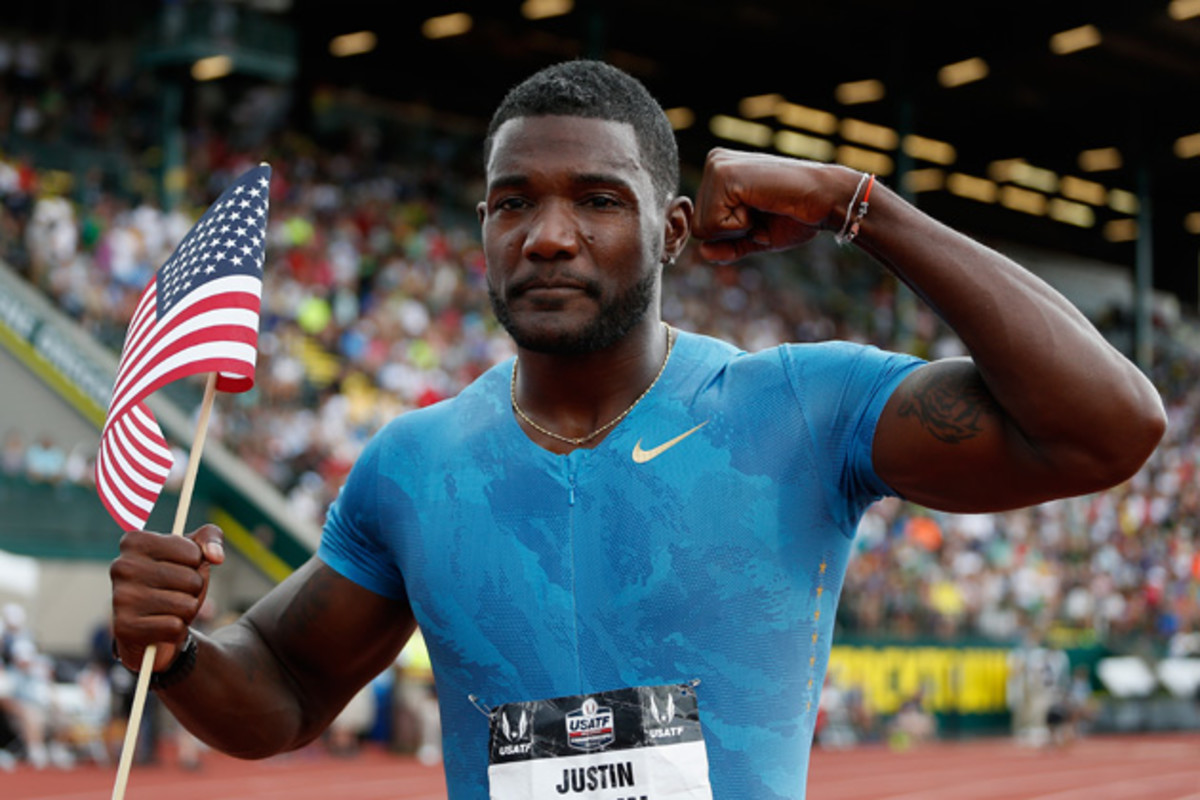
That all changed in 2006, when Gatlin tested positive for “testosterone or its precursors” at the Kansas Relays. Long story short, because you know it already, Gatlin fought the positive in court by claiming in sworn testimony that he was sabotaged and eventually received a four-year suspension that was reduced from eight years because he provided evidence to investigators. Gatlin returned in 2010, some 25 pounds over his best racing weight (because he had tried to play professional football and, in general, just not worked hard enough) and ran slowly. He has run faster ever since, to the point that his personal best of 9.74 in May at a meet in Doha is the fastest time in the world for 2015 and much faster than Bolt has run this season.
Though Gatlin has not tested positive for anything on his comeback, studies have shown that the benefits of long-term steroid use can last for many years. To which Gatlin said to me in June, “I was never a long-term steroid user.” Critics willing to accept that statement nonetheless attack Gatlin for running progressively faster from age 30 to 33, which is not normal. No man has run faster older than Gatlin. Hence, the thinking goes, he must be back on drugs. Here again, an explanation is provided: Gatlin’s agent, Renaldo Nehemiah, points out that Gatlin was idle for four years in the prime of his career and thus he is, effectively, 29, not 33. He is also regarded by most of the track world as a two-time loser, because of a positive test in 2002 for amphetamines, the result of his having been taking Adderall for 10 years to treat attention deficit disorder. This part of the equation is flat-out unfair. But so it goes, endlessly.
And we arrive at this:
Bolt—Superhero, defender of all that is right and good and fast. Gatlin—Cheater, embodiment of a broken system that’s killing a sport.
USATF: Athletes can wear sponsors' gear at World Championships
Back to Bolt. I love the guy. I love watching him run, laugh, pose. What’s not to love? I’ve interviewed him four times at length, one-on-one, and he’s engaged and candid. (Not unlike Gatlin, I should add.) When I talked with him for an hour in the fall of 2012 in New York, I showed him an article that linked him—without any supporting evidence— to notorious Mexican steroid dealer Angel (Memo) Heredia. To be honest, I just wanted to get Bolt on the record denying having ever used steroids. Bolt looked at Heredia’s name on my phone and scrunched up his nose and shook his head and said to me, “Who is that? I’ve never heard of him.” (His management team was not thrilled that I asked, or that I asked further, if Bolt had ever doped, to which he said, “Never.”) I was a teenager when Prefontaine was running, so there has never been a track athlete who’s made me feel more connected to the sport than Bolt.
However: I don’t know if he’s any cleaner than Gatlin. (Nor do I know if Gatlin is clean. And at this point I can’t recommend strongly enough this study of the complexity of drug testing by my former SI colleague David Epstein).
Bolt has never tested dirty. There’s no reason to think he’s doped, except that he runs way faster than everybody else. But damning athletes for excellence sends us all down a bottomless rabbit hole. There are ways to explain Bolt’s transcendence, if you are inclined. (Though one explanation, that he was exceptional at a very young age, doesn’t work for me. Marion Jones was also exceptional at a very young age.) If you want to believe in track and field, it helps to start with Bolt. But please don’t say that Bolt’s greatness proves that greatness is possible without drugs. Bolt’s greatness proves that greatness is possible if you are built like a velociraptor and train your ass off. A U.S. 400-meter runner trying to break 45 seconds and contend for a place on the Olympic 4x4 and score a minimal shoe contract won’t take much solace from Bolt’s dedication and success. Whether clean, dirty or from another dimension, Bolt is an outlier.
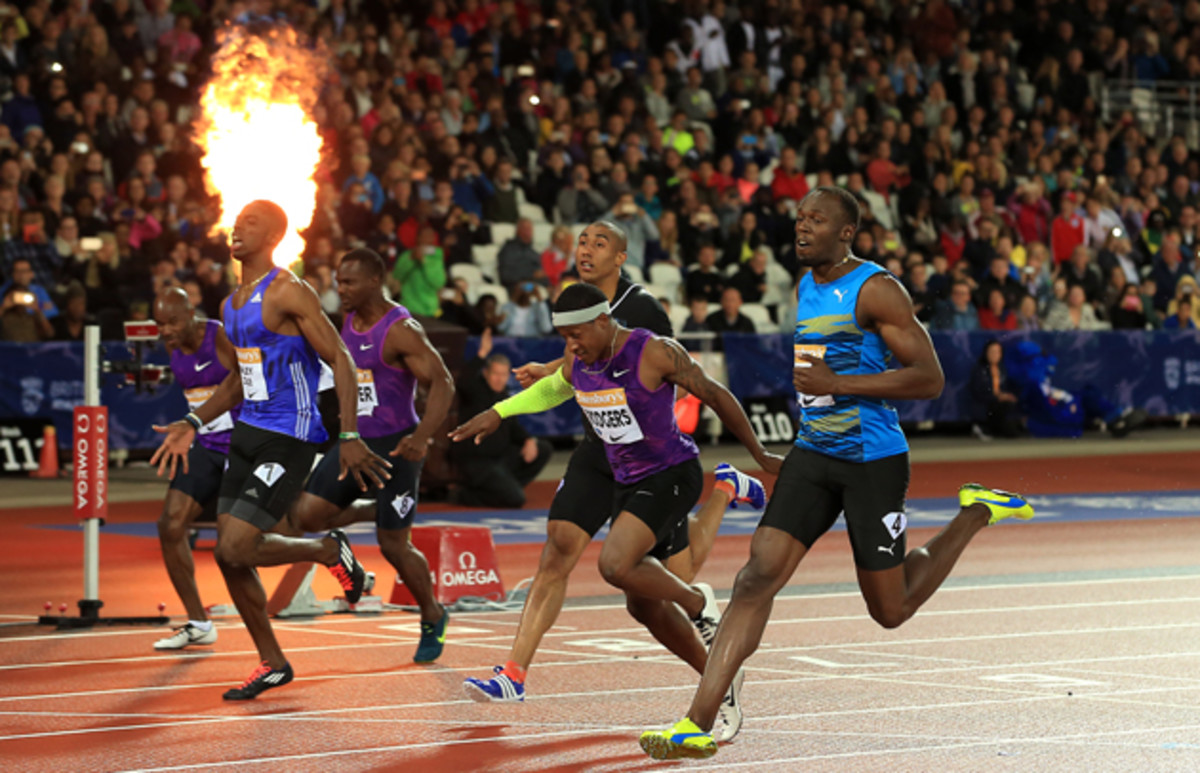
That doesn’t mean he will beat Gatlin. As late as June, in the Adidas Grand Prix in New York, Bolt staggered to a 200-meter victory in 20.29 seconds. He looked terrible and admitted it, calling his curve one of the worst he has ever run. (Bolt is good at beating himself up, too, and admitting insecurity; better than most athletes at this.) He took some time to train, visited his doctor in Germany and emerged in London in late July to run an easy 9.87 in a semifinal and then a much harder 9.87 in the final. There are many questions. Is Bolt healthy enough to run 9.7? Is he approaching that point at which his big body is ready to start slowing down? Gatlin has run sparingly since June. Is he past his peak for the year? Know this: Bolt will run the best he can run. He competes. And Gatlin won’t choke in the face of Bolt’s presence; he is not wired that way. They haven’t faced each other in two years (not a good thing for the sport, either, but another discussion altogether). Take the morality play out of the mix, and it’s a fascinating showdown, a precursor to next summer’s Olympics in Rio.
Yet there is that morality play. The polarization here is out of proportion to any moment. If Bolt crushes Gatlin Sunday, not all is right with the sport. If Gatlin beats Bolt, not all is lost. Bolt’s legacy is safe for eternity. Gatlin has already made a pile of money in his comeback. Some segment of the general public might catch the news of Gatlin’s victory and be appropriately shocked and outraged, but these are world championships, not Olympics. The audience is vastly smaller. A Bolt defeat does not doom the sport. NBC has already paid the rights fee for next summer.
What we have Sunday is a simple footrace. Track and field’s problems will still be there at the finish.
